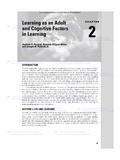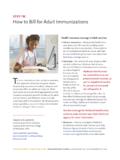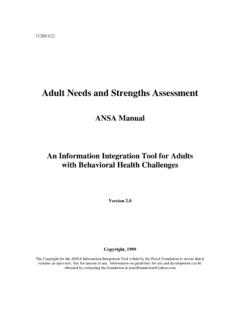Transcription of The Well-being of Nations The Well-being - OECD
1 ISBN 92-64-18589-596 2001 01 1 PThe Well-being of NationsTHE ROLE OF HUMAN AND SOCIAL CAPITALEDUCATION AND SKILLSThe Well-being of NationsThe Well-being of NationsTHE ROLE OF HUMAN AND SOCIAL CAPITAL In a rapidly changing world, the success of Nations , communities and individuals may be linked morethan ever before, to how they adapt to change, learn and share report helps clarify the concepts of human and social capital and evaluates their impact oneconomic growth and Well-being . Although the evidence on social capital is less developed, reflectingthe novelty of the concept in economic and social science, the report draws on a number of empiricalstudies which suggest potentially important linkages between human and social capital. The evidence suggests that human and social capital can be of key importance in contributing to awide range of positive outcomes, including higher income, life satisfaction and social there is no evidence for systematic "under-investment" in either human or social capital,concerns are expressed about the distribution and quality of each form of capital and how this mightimpact on future Well-being .
2 There is limited scope for public policy to change the quality, stock anddistribution of human and social capital in the short-term. However, a number of areas are discussedin which public, private and voluntary actors may leverage long-term improvements in both humanand social capital. EDUCATION AND :HSTCQE=V]Z]^U:Centre for Educational Research and InnovationThe Well-being of NationsTHE ROLE OF HUMAN AND SOCIAL CAPITALORGANISATION FOR ECONOMIC CO-OPERATION AND DEVELOPMENTORGANISATION FOR ECONOMIC CO-OPERATION AND DEVELOPMENTP ursuant to Article 1 of the Convention signed in Paris on 14th December 1960, and which cameinto force on 30th September 1961, the Organisation for Economic Co-operation and Development(OECD) shall promote policies designed: to achieve the highest sustainable economic growth and employment and a rising standard ofliving in Member countries, while maintaining financial stability, and thus to contribute to thedevelopment of the world economy; to contribute to sound economic expansion in Member as well as non-member countries in theprocess of economic development.
3 And to contribute to the expansion of world trade on a multilateral, non-discriminatory basis in accordancewith international original Member countries of the OECD are Austria, Belgium, Canada, Denmark, France,Germany, Greece, Iceland, Ireland, Italy, Luxembourg, the Netherlands, Norway, Portugal, Spain,Sweden, Switzerland, Turkey, the United Kingdom and the United States. The following countriesbecame Members subsequently through accession at the dates indicated hereafter: Japan(28th April 1964), Finland (28th January 1969), Australia (7th June 1971), New Zealand (29th May 1973),Mexico (18th May 1994), the Czech Republic (21st December 1995), Hungary (7th May 1996), Poland(22nd November 1996), Korea (12th December 1996) and Slovak Republic (14th December 2000).
4 TheCommission of the European Communities takes part in the work of the OECD (Article 13 of the OECDC onvention).The Centre for Educational Research and Innovation was created in June 1968 by the Council of the Organisation forEconomic Co-operation and Development and all Member countries of the OECD are main objectives of the Centre are as follows: analyse and develop research, innovation and key indicators in current and emerging education and learning issues,and their links to other sectors of policy; explore forward-looking coherent approaches to education and learning in the context of national and internationalcultural, social and economic change; and facilitate practical co-operation among Member countries and, where relevant, with non-member countries, in orderto seek solutions and exchange views of educational problems of common Centre functions within the Organisation for Economic Co-operation and Development in accordance with thedecisions of the Council of the Organisation, under the authority of the Secretary-General.
5 It is supervised by a GoverningBoard composed of one national expert in its field of competence from each of the countries participating in its programmeof en fran ais sous le titre :DU BIEN- TRE DES Nations :Le r le du capital humain et social OECD 2001 Permission to reproduce a portion of this work for non-commercial purposes or classroom use should be obtainedthrough the Centre fran ais d exploitation du droit de copie (CFC), 20, rue des Grands-Augustins, 75006 Paris,France, tel. (33-1) 44 07 47 70, fax (33-1) 46 34 67 19, for every country except the United States. In the United Statespermission should be obtained through the Copyright Clearance Center, Customer Service, (508)750-8400,222 Rosewood Drive, Danvers, MA 01923 USA, or CCC Online: All other applications for permissionto reproduce or translate all or part of this book should be made to OECD Publications, 2, rue Andr -Pascal, 75775 ParisCedex 16, France.
6 3 OECD 2001 FOREWORDThis report is a publication of the Centre for Educational Research and Innovation at the OECD. Itwas co-authored by Tom Healy and Sylvain C t , with significant input from John F. Helliwell (Universityof British Columbia, Canada), Simon Field and many other colleagues within the OECD report profited greatly from the advice of a wide range of both academic experts and officialcountry representatives at meetings of OECD committees and boards which guided the development ofthe work. Two outside events were also particularly significant: first, an international symposium organ-ised and co-sponsored by Human Resources Development Canada (HRDC) and the OECD on The Contri-bution of Human and Social Capital to Sustained Economic Growth and Well-being held in March 2000 in Qu becCity, Canada; second, a meeting of a group of experts on human and social capital who met at the OECDin July 2000 to review the first draft of this volume is published on the responsibility of the Secretary-General of the Well-being of Nations 4 OECD 2001 AcknowledgementsAmong the international group of experts who contributed to the report, particular thanks are due to:Gunnar Eliasson (Royal Institute of Technology in Stockholm), Dominique Foray (Universit Dauphine, Paris),David Halpern (University of Cambridge, UK), Tom Kellaghan (Education Research Centre, Ireland), Bengt-Aake Lundvall(Aalborg University, Denmark), Peter MacDonagh (advisor to the Irish Prime Minister), Lars Osberg (University ofDalhousie, Canada), Robert D.
7 Putnam (Harvard University, US), Jo Ritzen (Vice-President, World Bank), Tom Schuller(Birkbeck College, UK), Simon Szreter (University of Cambridge, UK), Jonathan Temple (Oxford College, UK),Doug Willms (University of New Brunswick, Canada), Michael Woolcock (World Bank), Jean-Pierre Worms (Centre deSociologie des Organisations, Paris).Special thanks are due to Human Resources Development Canada (HRDC), particularly to Jean-Pierre Voyerand Richard Roy, for supporting the project at various stages, for funding the secondment of Sylvain C t to theOECD secretariat, and for co-sponsoring the symposium in Quebec City in March 2000. 5 OECD 2001 TABLE OF CONTENTSI ntroduction ..7 Chapter Social and Economic are today s governments and societies concerned about? .. is happening in some of these key areas of concern?.. inter-relationship between Well-being and human and social capital.
8 Well-being sustainable over time?..14 Notes ..15 Chapter Evidence on Human .. do we mean by human capital? .. do we measure human capital?.. is human capital developed? .. is human capital distributed?.. demand for human is the impact of human capital on economic Well-being ? .. is the impact of human capital on all aspects of human Well-being ? .. up ..35 Notes ..37 Chapter Evidence on Social .. concepts of social capital .. do we measure social capital?.. sources of social trust and civic participation changing over time?.. lies behind changes in levels of trust and civic participation? .. is the impact of social capital on Well-being ? .. relationship between social capital and social of social capital on economic Well-being ..62 Chapter Implications and Further Research .. for human capital .. for social capital.
9 Gaps and future areas of research ..72 The Well-being of Nations 6 OECD 2001 Appendix Measures of 73 Appendix Trends in the Social and Economic 80 Appendix of School Attainment: the Research 90 Appendix Impact of Human Capital on Economic Growth: Some Major 95 Appendix Trust and Civic Engagement Declining in OECD Countries?.. 99 References .. 105 List of measure of trust (World Values Study), 1995-96 .. impact of education in cross-country regression analysis: some major studies .. 96 List of between human Well-being , economic Well-being and inputs to human Well-being and their inter-relationships .. distribution of literacy levels .. of the Osberg Index .. comparisons of trends in economic gross domestic product per capita, in constant prices,average based on selected OECD countries, 1966-99.
10 In income inequality for the entire population, selected OECD countries,mid-1980s and mid-1990s .. of children living in relative poverty, selected OECD countries, 1990s .. rates, 25-54 year-olds and 15-24 year-olds, selected OECD countries, 1975-99 .. ratios, OECD countries, of the population 25-64 years of age in OECD countries with completed upper secondary education or higher, 1950-98 .. of lone-parenting, selected OECD countries, comparison between the 1980s and 1990s .. in earnings between men and women, 25-64 year-olds (for full-time workers), 1980s to 1990s .. labour force participation rates for men and women aged 15-64,selected OECD countries, 1960-99 .. of foreigners into OECD countries, 1999 .. of acute drug-related deaths recorded in the European Unionper million people, victimisation rates, 1980s and life expectancy at birth, selected OECD countries, 1960-98.















